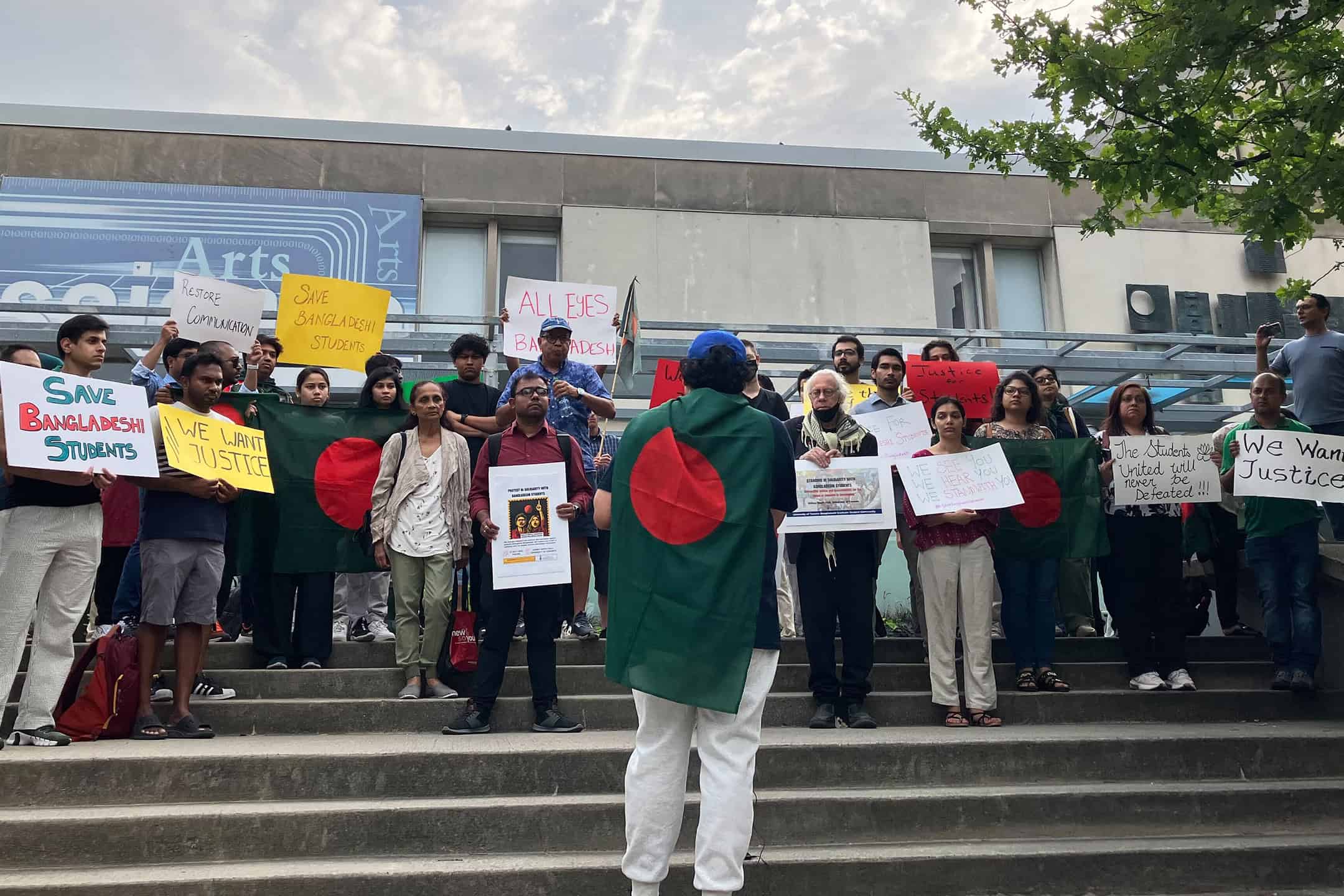At 7:00 pm on July 22, around 50 students gathered in front of Sidney Smith Hall in solidarity with the ongoing student-led protests in Bangladesh. The protest was co-organized by U of T’s Bangladeshi Students’ Association (BSA) and Bangladeshi Graduate Students Community.
The protest at Sidney Smith follows recent solidarity protests in Ottawa, where protesters marched from Parliament Hill to the Bangladesh High Commission. These movements are a response to the Bangladeshi police’s violent crackdown on student protesters — thousands of whom have demanded the abolition of a quota system that reserves jobs for descendants of veterans who fought for the country’s independence in 1971. Students began protesting against the reinstatement of the quota in June, following its brief abolishment in 2018, as 18 million young people in the country are unemployed.
As of July 27, nearly 200 people have died in the protests and more than 2500 people were arrested. Following a five-day internet shutdown, the country continues to experience partial internet disruptions.
The protest
Students first gathered on the steps in front of Sidney Smith Hall, holding the flag of Bangladesh. At around 7:20 pm, they began by playing the national anthem of Bangladesh.
Some protesters held signs that read, “Save Bangladeshi Students,” while one sign read “Restore Communication.” Starting on July 18, Bangladesh experienced a five-day telecommunications and internet blackout, with social media platforms such as WhatsApp and Facebook reportedly unavailable.
Following the anthem, a speaker presented the Bangladeshi Graduate Students Community’s statement of solidarity with the student protests in Bangladesh. The statement called on U of T to publicly condemn the violence in Bangladesh and express solidarity with Bangladeshi students in Toronto. It also expressed the community’s “unwavering solidarity” with the peaceful protesters demanding “fair employment opportunities.”
The statement follows the BSA’s earlier statement from July 16, which supported students’ right to protest without facing violence, noting that “student protests always have been, and continue to be, at the core of the history of Bangladesh and Bengal.”
In an email to The Varsity, Sandy Welsh — Vice-Provost, Students — wrote that U of T is prioritizing providing tangible support to U of T members affected by international events. Welsh noted that her Office has been “in touch with the Bangladeshi Students’ Association to ensure its members are aware of [U of T’s] supports and resources.”
Her statement also noted that, based on the school’s Memo on Institutional, Divisional, and Departmental Statements from April, U of T will “generally not issue institutional statements in response to local and international events.”
After a moment of silence for the Bangladeshi students who lost their lives in the protests, David Omar — BSA’s co-vice president and a third-year student studying public policy and political science — spoke to the protesters. While acknowledging the Bangladesh Supreme Court’s decision on July 21 to reduce the government job quota for veterans’ descendants from 30 per cent to five per cent, Omar noted that “the fight is not over.” He emphasized that the student protesters are still fighting for one thing: “Justice for the hundreds of students [who] lost their lives in the fight.”
In an email to The Varsity, Rubaina Farin — an incoming graduate student studying biomedical engineering who attended the Sidney Smith protest — wrote that, “protests are essential because they shine a light on issues that might otherwise be ignored, especially when local networks are limited.”
“By bringing these struggles to the forefront, protests can mobilize global solidarity and aid,” she wrote.
“A state of utter confusion and chaos”
Students expressed concerns over being unable to accurately understand the levels of violence and their families’ safety in Bangladesh.
In an interview with The Varsity at the protest, Omar discussed the ambiguity surrounding the number of student deaths, explaining that “It’s hard to verify the news that [is] coming out because of the blackout. And as a result, we are all left in a state of utter confusion and chaos.”
Omar, whose parents and sister live in Bangladesh, recalled his efforts and those of other Bangladeshi international students to contact family and friends back home. He noted that “if you’re lucky enough, the call will go through and you will be able to talk to your parents, although the connection is absolutely terrible.”
“Simply just hearing my mother’s voice is enough for me,” he said. “And that’s how it’s been for the past five days for all of us.”
Internet service in Bangladesh was partially restored on July 24, but there continue to be disruptions as of July 27.
Editor’s Note (July 30, 3:36 pm): This story has been updated to include Vice-Provost, Student, Sandy Welsh’s statement to The Varsity.



No comments to display.